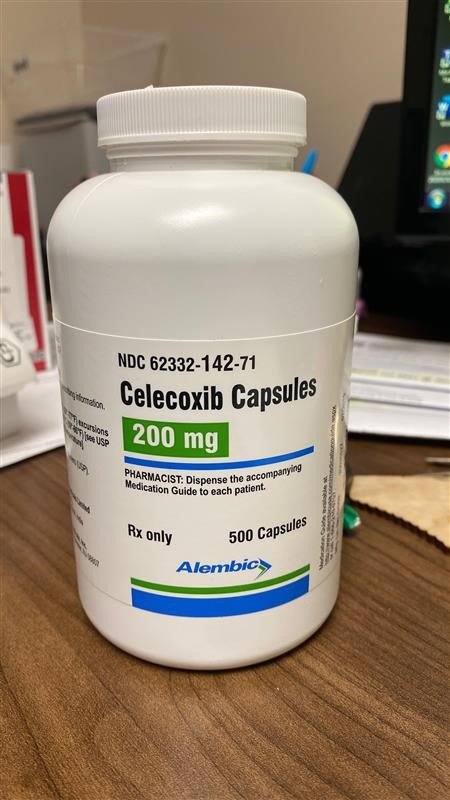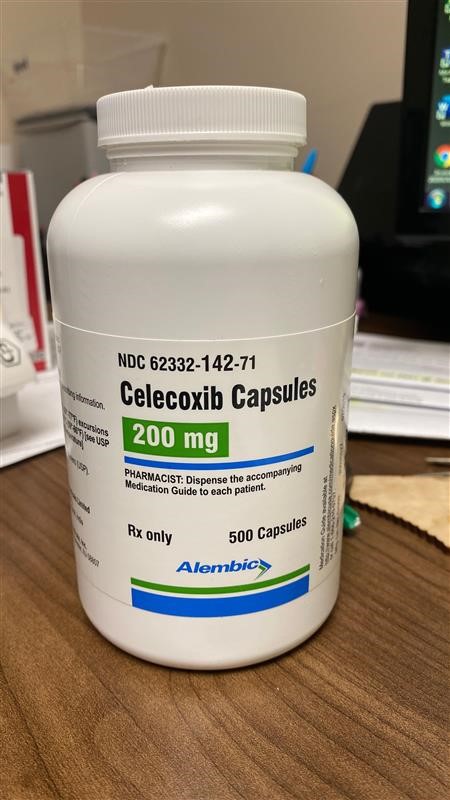Label: CELECOXIB capsule
- NDC Code(s): 80175-0142-3
- Packager: Central Packaging
- This is a repackaged label.
- Source NDC Code(s): 62332-142
- Category: HUMAN PRESCRIPTION DRUG LABEL
- DEA Schedule: None
- Marketing Status: Abbreviated New Drug Application
Drug Label Information
Updated February 22, 2021
If you are a consumer or patient please visit this version.
- Download DRUG LABEL INFO: PDF XML
- Medication Guide: HTML
- Official Label (Printer Friendly)
-
CONTRAINDICATIONS
Celecoxib is contraindicated in the following patients: · Known hypersensitivity (e.g., anaphylactic reactions and serious skin reactions)to celecoxib, any components of the drug product [see Warnings and Precautions (5.7, 5.9)].· History of asthma, urticaria, or other allergic-type reactions after taking aspirin or other NSAIDs. Severe, sometimes fatal, anaphylactic reactions to NSAIDs, have been reported in such patients [see Warnings and Precautions (5.7, 5.8)]. · In the setting of coronary artery bypass graft (CABG) surgery [see Warnings and Precautions (5.1)].· In patients who have demonstrated allergic-type reactions to sulfonamides.
-
LABORATORY TESTS
Because serious GI bleeding, hepatotoxicity, and renal injury can occur without warning symptoms or signs, consider monitoring patients on long-term NSAID treatment with a CBC and a chemistry profile periodically [see Warnings and Precautions (5.2, 5.3, 5.6)]. In controlled clinical trials, elevated BUN occurred more frequently in patients receiving celecoxib compared with patients on placebo. This laboratory abnormality was also seen in patients who received comparator NSAIDs in these studies. The clinical significance of this abnormality has not been established.
-
DOSAGE FORMS & STRENGTHS
Celecoxib capsules: 50 mg are opaque white/opaque white hard gelatin capsules size “5” having imprinting “134” on body with red ink and “A” on cap with red ink filled with white to off-white colored granular powder. 100 mg are opaque white/opaque white hard gelatin capsules size “3” having imprinting “135” on body with blue ink and “A” on cap with blue ink filled with white to off-white colored granular powder. 200 mg are opaque white/opaque white hard gelatin capsules size “1” having imprinting “136” on body with golden yellow ink and “A” on cap with golden yellow ink filled with white to off-white colored granular powder. 400 mg are opaque white/opaque white hard gelatin capsules size “00” having imprinting “137” on body with green ink and “A” on cap with green ink filled with white to off-white colored granular powder.
-
MEDICATION GUIDE
Medication Guide
for
Non-Steroidal Anti-Inflammatory Drugs (NSAIDs)
(See the end of this Medication Guide for a list of prescription NSAID medicines.)What is the most important information I should know about medicines called Non-Steroidal Anti-Inflammatory Drugs (NSAIDs)?
NSAID medicines may increase the chance of a heart attack or stroke that can lead to death.
This chance increases:
with longer use of NSAID medicines
in people who have heart diseaseNSAID medicines should never be used right before or after a heart surgery called a "coronary artery bypass graft (CABG)."
NSAID medicines can cause ulcers and bleeding in the stomach and intestines at any time during treatment. Ulcers and bleeding:
can happen without warning symptoms
may cause deathThe chance of a person getting an ulcer or bleeding increases with:
taking medicines called "corticosteroids" and "anticoagulants"
longer use
smoking
drinking alcohol
older age
having poor healthNSAID medicines should only be used:
exactly as prescribed
at the lowest dose possible for your treatment
for the shortest time neededWhat are Non-Steroidal Anti-Inflammatory Drugs (NSAIDs)?
NSAID medicines are used to treat pain and redness, swelling, and heat (inflammation) from medical conditions such as:
different types of arthritis
menstrual cramps and other types of short-term painWho should not take a Non-Steroidal Anti-Inflammatory Drug (NSAID)?
Do not take an NSAID medicine:
if you had an asthma attack, hives, or other allergic reaction with aspirin or any other NSAID medicine
for pain right before or after heart bypass surgeryTell your healthcare provider:
about all of your medical conditions.
about all of the medicines you take. NSAIDs and some other medicines can interact with each other and cause serious side effects. Keep a list of your medicines to show to your healthcare provider and pharmacist.
if you are pregnant. NSAID medicines should not be used by pregnant women late in their pregnancy.
if you are breastfeeding. Talk to your doctor.What are the possible side effects of Non-Steroidal Anti-Inflammatory Drugs (NSAIDs)?
Serious side effects include: Other side effects include:
heart attack
stroke
high blood pressure
heart failure from body swelling (fluid retention)
kidney problems including kidney failure
bleeding and ulcers in the stomach and intestine
low red blood cells (anemia)
life-threatening skin reactions
life-threatening allergic reactions
liver problems including liver failure
asthma attacks in people who have asthmastomach pain
constipation
diarrhea
gas
heartburn
nausea
vomiting
dizzinessGet emergency help right away if you have any of the following symptoms:
shortness of breath or trouble breathing
chest pain
weakness in one part or side of your bodyslurred speech
swelling of the face or throatStop your NSAID medicine and call your healthcare provider right away if you have any of the following symptoms:
nausea
more tired or weaker than usual
itching
your skin or eyes look yellow
stomach pain
flu-like symptomsvomit blood
there is blood in your bowel movement or it is black and sticky like tar
skin rash or blisters with fever
unusual weight gain
swelling of the arms and legs, hands and feetThese are not all the side effects with NSAID medicines. Talk to your healthcare provider or pharmacist for more information about NSAID medicines.
Call your doctor for medical advice about side effects. You may report side effects to FDA at 1-800-FDA-1088.
Other information about Non-Steroidal Anti-Inflammatory Drugs (NSAIDs)
Aspirin is an NSAID medicine but it does not increase the chance of a heart attack. Aspirin can cause bleeding in the brain, stomach, and intestines. Aspirin can also cause ulcers in the stomach and intestines.
Some of these NSAID medicines are sold in lower doses without a prescription (over –the –counter). Talk to your healthcare provider before using over –the –counter NSAIDs for more than 10 days.NSAID medicines that need a prescription
Generic Name Tradename
*Vicoprofen contains the same dose of ibuprofen as over-the-counter (OTC) NSAIDs, and is usually used for less than 10 days to treat pain. The OTC NSAID label warns that long term continuous use may increase the risk of heart attack or stroke. - PRINCIPAL DISPLAY PANEL
-
INGREDIENTS AND APPEARANCE
CELECOXIB
celecoxib capsuleProduct Information Product Type HUMAN PRESCRIPTION DRUG Item Code (Source) NDC:80175-0142(NDC:62332-142) Route of Administration ORAL Active Ingredient/Active Moiety Ingredient Name Basis of Strength Strength CELECOXIB (UNII: JCX84Q7J1L) (CELECOXIB - UNII:JCX84Q7J1L) CELECOXIB 200 mg Product Characteristics Color white Score no score Shape CAPSULE Size 19mm Flavor Imprint Code A;136 Contains Packaging # Item Code Package Description Marketing Start Date Marketing End Date 1 NDC:80175-0142-3 30 in 1 BOTTLE; Type 0: Not a Combination Product 12/01/2015 Marketing Information Marketing Category Application Number or Monograph Citation Marketing Start Date Marketing End Date ANDA ANDA204519 12/01/2015 Labeler - Central Packaging (117617671) Establishment Name Address ID/FEI Business Operations Central Packaging, LLC 117617671 repack(80175-0142)


